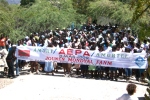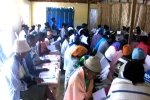Sources Chaudes, March 8th of 2009
There are various social projects in Haiti which reflect the principles and concepts of the paradigm-shifting PROUT socio-economic system. It is rare to find however initiatives which directly address the root causes of the main social problems in the country and of humanity as a whole. Empowering local women which were oppressed or neglected for generations is certainly one of the strongest forces today to promote a positive and holistic social change.
- Appreciating and enjoying local cultural expressions
- Grassroots and global NGOs working hand in hand
- Leader from AEPA
- Training on micro-economy
Awakening the Anse Rouge Commune
The practical work of the NGOs AMURTEL and AEPA mobilizes the core issues sustaining or aggravating the current Haitian situation. Together they started a continuous leadership and community training program at perhaps the hardest of the environments in Haiti, the semi-desert area of the Anse Rouge Commune, at the Northwest of the Artibonite Department. This region, once a tourist paradise with natural hot water spa treatment and luxurious accommodations during colonial times, has reached extreme levels of degradation in various spheres: rampant environmental devastation and desertification, increasing regional emigration, lack or complete absence of minimum living necessities to the population, reaching the lowest levels further below the national average, not to mention the dire consequences of this long-term imbalance and derangement such as the natural disasters, erosion, floods, drought and collapse of social structures.
Determined to tackle these conditions even though governmental and non-governmental agencies have abandoned the zone, Proutists from Haiti and abroad have systematically worked within the community to awaken and support their own local potentialities.
The Blooming of Women’s Force
Here below we quote the impressions from Dinali Abeysekera, Women’s Empowerment Project Coordinator for AMURT/EL in Haiti:
“Just two years ago, not a single women’s organization existed in this commune. Today the women are not only marching together in solidarity, but they are working together in cooperative organizations to operate businesses, improve their health, and provide support to their families and children.”
Dinali describes the context in which these organizations were born, culminating with this years’ historical March 8th’s commemoration:
“34 AEPA women’s groups attended a weekend training and the parade in Ti Plas and Source Chaudes villages. All members of these 34 women’s groups (a minimum of 500 people) have been undergoing intensive AEPA training and monitoring weekly community meetings since June of 2008. These women’s groups decided they wanted to create small businesses based on their interests and community needs, and collectively invested their resources to make this happen. All of their businesses have already started, many of which are in their start-up phases.
Micro-credit cooperative
AMURTEL trained AEPA monitors in becoming trainers on regionally specific small business development and financial planning. The women’s groups have been taking this training over the month of February. AEPA and AMURTEL have now reached the phase of creating a cooperatively-run, micro-credit bank. The bank will serve AEPA women’s groups, by offering them small loans and further training to develop their own cooperatively run business to become profitable, sustainable, and able to assist the women to reach their long-term business/financial/personal goals. The events of International Women’s Day were held to not only celebrate and bring awareness to the rights of women, but also to celebrate the tremendous journey and vision of these 34 groups, and the beginning of a new phase and page in the local history, through the development of the area by the strength and leadership of the local women.”
For more information about AMURT/EL in Haiti, visit www.amurthaiti.org





Leave a comment
Comments feed for this article